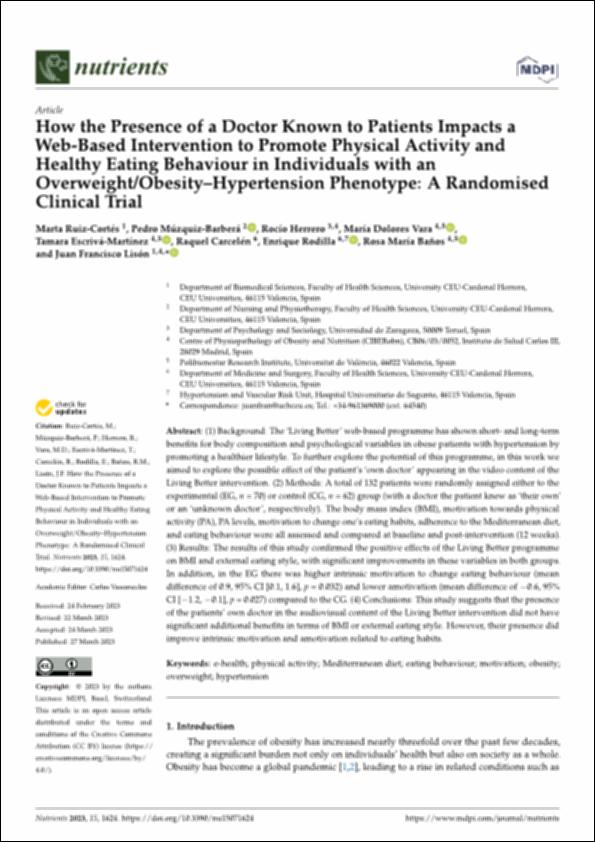Por favor, use este identificador para citar o enlazar este ítem:
http://hdl.handle.net/10637/14772How the presence of a doctor known to patients impacts a web-based intervention to promote physical activity and healthy eating behaviour in individuals with an overweight/obesity–hypertension phenotype: a randomised clinical trial
| Título : | How the presence of a doctor known to patients impacts a web-based intervention to promote physical activity and healthy eating behaviour in individuals with an overweight/obesity–hypertension phenotype: a randomised clinical trial |
| Autor : | Ruiz Cortés, Marta Múzquiz Barberá, Pedro Herrero, Rocío Vara Villodre, María Dolores Escrivá Martínez, Tamara Carcelén González, Raquel Rodilla Sala, Enrique Baños Rivera, Rosa María Lisón Párraga, Juan Francisco |
| Materias: | Obesity; Obesidad; Dietética; Dietetics; Motivación; Motivation; Physical education; Educación física; Costumbres alimenticias; Food customs |
| Editorial : | MDPI |
| Citación : | Ruiz-Cortés, M., Múzquiz-Barberá, P., Herrero, R., Vara, M.D., Escrivá-Martínez, T., Carcelén, R., Rodilla, E., Baños, R.M. & Lisón, J.F. (2023). How the presence of a doctor known to patients impacts a web-based intervention to promote physical activity and healthy eating behaviour in individuals with an overweight/obesity–hypertension phenotype: a randomised clinical trial. Nutrients, vol. 15, i. 7, art. 1624 (27 mar.). DOI: https://doi.org/10.3390/nu15071624 |
| Resumen : | Background: The ‘Living Better’ web-based programme has shown short- and long-term benefits for body composition and psychological variables in obese patients with hypertension by promoting a healthier lifestyle. To further explore the potential of this programme, in this work we aimed to explore the possible effect of the patient’s ‘own doctor’ appearing in the video content of the Living Better intervention. (2) Methods: A total of 132 patients were randomly assigned either to the experimental (EG, n = 70) or control (CG, n = 62) group (with a doctor the patient knew as ‘their own’ or an ‘unknown doctor’, respectively). The body mass index (BMI), motivation towards physical activity (PA), PA levels, motivation to change one’s eating habits, adherence to the Mediterranean diet, and eating behaviour were all assessed and compared at baseline and post-intervention (12 weeks). (3) Results: The results of this study confirmed the positive effects of the Living Better programme on BMI and external eating style, with significant improvements in these variables in both groups. In addition, in the EG there was higher intrinsic motivation to change eating behaviour (mean difference of 0.9, 95% CI [0.1, 1.6], p = 0.032) and lower amotivation (mean difference of −0.6, 95% CI [−1.2, −0.1], p = 0.027) compared to the CG. (4) Conclusions: This study suggests that the presence of the patients’ own doctor in the audiovisual content of the Living Better intervention did not have significant additional benefits in terms of BMI or external eating style. However, their presence did improve intrinsic motivation and amotivation related to eating habits. |
| Descripción : | Este artículo pertenece al número especial "Combined Nutrition and Exercise Interventions in Community Groups - 2nd Edition". |
| URI : | http://hdl.handle.net/10637/14772 |
| Derechos: | http://creativecommons.org/licenses/by/4.0/deed.es OpenAccess |
| ISSN : | 2072-6643 (Electrónico) |
| Fecha de publicación : | 27-mar-2023 |
| Centro : | Universidad Cardenal Herrera-CEU |
| Aparece en las colecciones: | Dpto. Ciencias Biomédicas |
Los ítems de DSpace están protegidos por copyright, con todos los derechos reservados, a menos que se indique lo contrario.


